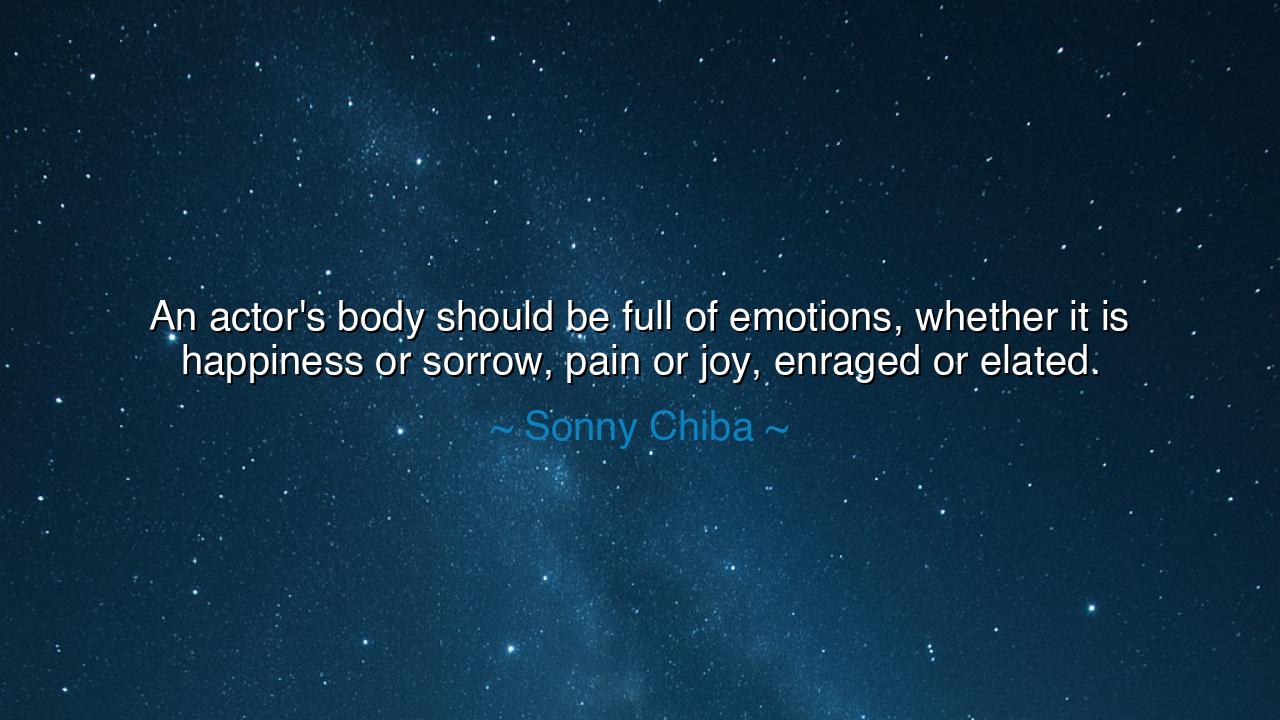
An actor's body should be full of emotions, whether it is
An actor's body should be full of emotions, whether it is happiness or sorrow, pain or joy, enraged or elated.






Hear the words of Sonny Chiba, warrior of the screen and master of expression, who declared: “An actor’s body should be full of emotions, whether it is happiness or sorrow, pain or joy, enraged or elated.” In these words burns the flame of an ancient truth — that art is not illusion, but transformation; that the body of the artist is not a vessel for vanity, but an instrument for truth. For to embody emotion is to touch the living pulse of humanity, to allow the invisible to take form in flesh and movement. The actor, as Chiba reminds us, must not merely imitate feeling, but become it — a living bridge between the soul and the world.
The origin of this saying lies in Chiba’s own path — forged through discipline, hardship, and mastery. Before he was known as a legend of Japanese cinema, Sonny Chiba was a martial artist of great renown, trained in Kyokushin karate, a style that demands not only physical strength but emotional truth. To him, acting and combat were reflections of the same spirit: both required total presence, body and soul united. When he spoke of filling the body with emotions, he spoke as one who knew that movement without spirit is empty — that true art, like true battle, must rise from the depths of one’s being.
To the ancients, this truth was sacred. The Greek tragedians believed that the actor must become the vessel through which the gods themselves could speak. The great mask of the stage was not a disguise but a channel — through it, the divine emotions of life could be expressed, magnified, and purified. So too did the Japanese masters of Noh and Kabuki theatre believe that emotion, when perfectly embodied, could transcend the limits of the human and touch the eternal. Thus, when Chiba says an actor’s body must be “full of emotions,” he speaks in the language of the old ways — that the artist is a priest of feeling, carrying the sacred weight of joy and sorrow for all who watch.
But emotion, to Chiba, is not chaos — it is discipline. Just as the swordsman must control his rage lest it consume him, so must the actor harness his emotions, not to suppress them, but to direct them. Every gesture, every movement, every breath becomes a vessel of truth. When the actor’s body trembles with grief, it must not be false trembling, but the real pulse of empathy awakened within. When it radiates joy, that joy must come from deep understanding, not surface mimicry. For emotion, when truthfully expressed, can move nations, heal wounds, and awaken hearts. The actor, therefore, becomes not a performer but a messenger of life’s raw essence.
Consider the life of Toshiro Mifune, another giant of Japanese cinema, who worked alongside the legendary Akira Kurosawa. In his roles, Mifune’s entire being — his walk, his stance, his silence — spoke of the untamed spirit of man. Whether playing the stoic samurai or the broken rogue, his body was alive with controlled emotion, as if every muscle remembered the pain and pride of his character’s soul. He, like Chiba, understood that the body is not separate from emotion, but its first language. The audience does not believe words; it believes movement.
This teaching reaches beyond the art of acting. In truth, all human life is a form of performance — not in falsehood, but in expression. The teacher before the students, the parent before the child, the leader before the people — all must learn to embody their convictions, to let their emotions become visible in their actions. To live with sincerity is to let the heart flow through the body, to align one’s inner truth with outward motion. When you smile, let it come from the soul. When you weep, let it cleanse the heart. When you strive, let the whole body burn with purpose.
And so, O listener of time, let this wisdom dwell within you: fill your life, your art, your being with emotion. Do not fear it, for emotion is the proof of your humanity. But do not let it rule you blindly — let it serve truth, beauty, and compassion. Whether you are an artist, a warrior, or a seeker, let your body become the vessel of what your heart knows to be real. To move without emotion is to be hollow; to feel without purpose is to be lost. The path of mastery, as Chiba taught, lies in uniting the two — discipline and passion, mind and body, control and surrender.
Thus, when Sonny Chiba spoke of the actor’s body being full of emotions, he spoke to all who walk the stage of life. He called upon each soul to live truthfully, to embody the full range of human feeling without fear or shame. For in that fullness lies the art of being alive — the sacred dance of happiness and sorrow, pain and joy, rage and elation. To live thus is to perform the greatest role of all — not as an actor upon a screen, but as a human being upon the vast stage of existence itself.






AAdministratorAdministrator
Welcome, honored guests. Please leave a comment, we will respond soon